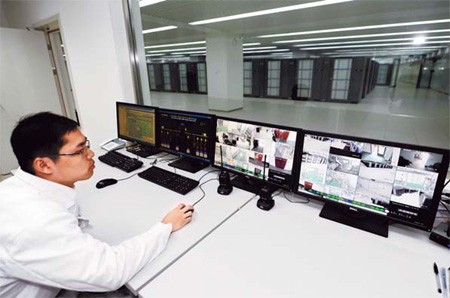Science and Health
World's fastest computer brings incalculable benefits
By Zhou Wa (China Daily)
Updated: 2010-12-08 07:37
 |
Large Medium Small |
Fission and chips
 |
|
A scientist monitors Tianhe-1A, the world's fastest supercomputer, on Nov 17 in Tianjin. [Yue Yuewei / Xinhua] |
Tianhe-1A was named No 1 in the latest rankings by Top500, an organization that collates information on high-powered computing, pushing Cray XT5 Jaguar in the United States into second place and Nebulae in Shenzhen, Guangdong province, into third.
Although China has two in the top 10, the field is still dominated by the US, which accounts for more than half of the supercomputers on the Top500 list.
Experts explained that despite major breakthroughs, work on supercomputing in China continues to be hampered by global difficulties with power supplies and human resources.
High-powered supercomputers soak up a lot of electricity and could prove a drain on the State Grid. As a solution, some experts have suggested systems are built near nuclear power plants to meet their consumption demands. However, with only 16 plants in operation (another seven are under construction), there is doubt the country has enough nuclear facilities to power even the 41 supercomputers it already has in the Top500 list.
Therefore, the mission for technicians is to build supercomputers that require less power.
Hu Qingfeng at NUDT suggested three possible solutions: develop low-power hardware, like central processing units (CPUs); make the computers' architecture more energy-efficient, such as replacing CPUs with energy-saving graphics processing units (GPUs), which Tianhe-1A has; or create a low-energy mechanism that integrates hardware and software.
The last option, explained Hu, means the software can first analyze the program, which will be run on the supercomputer, and evaluate how many hardware elements are necessary, shutting down those that are non-essential.
The manpower issue is another challenge altogether. As the number of people who can develop CPUs for supercomputer, as well as the software they operate, is extremely low worldwide, it is a problem affecting the entire industry.
With competition extremely fierce, poaching is now common.
According to Li Nan, chief project manager on the Tianhe-1A project, there were several overseas companies attempting to lure away his micro-electronics experts with one offered an annual salary of $300,000.
Lu Yutong, a professor at NUDT and a member of Li's team, also revealed that she was given the chance by a university to become a visiting scholar in 2008.
"I gave it up because I wanted to work on Tianhe-1A," she told China Daily. "I have absolutely no regrets."
Software engineers are usually expected to be familiar with computer science, programming and related applications like meteorology, geology and microphysics. Added to the complexity of supercomputing, finding suitable staff can be difficult.
"This software must make sure tens of thousands of processing units function concurrently and properly," said Yang Chao, a researcher at the Chinese Academy of Sciences' institute of software, who tested Tianhe-1A's CPU system for climate modeling and astrophysics study.
"Just like commanding a battle, it's easy to lead a platoon of 100 soldiers but much more difficult to conduct tens of thousands."
